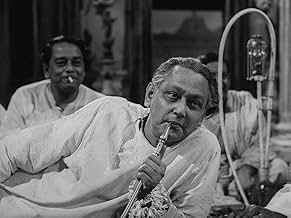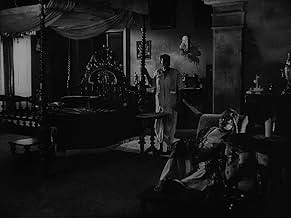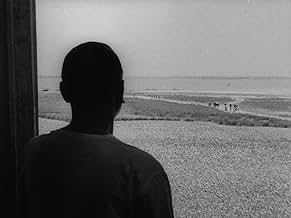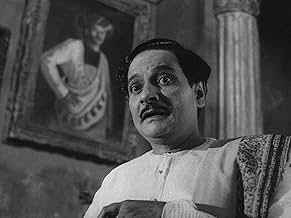Depicts the end days of a decadent zamindar (landlord) in Bengal, and his efforts to uphold his family prestige even when faced with economic adversity.Depicts the end days of a decadent zamindar (landlord) in Bengal, and his efforts to uphold his family prestige even when faced with economic adversity.Depicts the end days of a decadent zamindar (landlord) in Bengal, and his efforts to uphold his family prestige even when faced with economic adversity.
- Director
- Writers
- Stars
- Awards
- 3 wins & 2 nominations total
- Mahamaya, Roy's wife
- (as Padma Devi)
- Singer
- (as Begum Akhtar)
- Ustad Ujir Khan
- (as Ostad Wahed Khan)
- Director
- Writers
- All cast & crew
- Production, box office & more at IMDbPro
Featured reviews
"The Music Room", as it is known in English, is as much about the power of cinema as it is about that of music. It is as much about life as it is about death, both elliptically consummate by reason of each other: art as a life of inspiration, inspiration as regained strength. Art as addiction, addiction as loneliness, loneliness as death.
The ending is one of the most filmically mesmerizing moments I know of. Light and shadow, derangement and perspicuity, again life and death. And as for the Blu-ray (Region A) released by the Criterion Collection in 2011, it's phenomenal to the hilt, a cultural act in itself, in my books among their most enduring and best releases so far (perhaps only the complete Jean Vigo compares).
Written, produced & directed by Ray, the film concerns a feudal landlord's passion for music & quest for social respect in the rapidly changing India and his refusal to change with the times that leads to his undoing. Through his dwindling fortunes & decadent lifestyle, Ray attempts to illustrate the contrast between old & new India and the fate that awaits those who cling on to their obsolete past & are unwilling to accept or acknowledge the modern society.
Our protagonist isn't shown in a negative light however. Instead, the film observes his all-consuming obsession with music, pride in his social prestige & envy for his next-door neighbour's increasing fortunes, and how they contribute to his downfall. Chabbi Biswas' performance is nearly flawless, and he brings the ill-fated landlord to life with all his flaws & virtues in tact. Also adding to the experience are opulent set pieces, beautiful camerawork, and neat use of classical Indian music & dance.
Overall, Jalsaghar presents the Bengali filmmaker tightening his grasp around his craft, and is one of his most impressive directorial efforts. Much worthy of broader viewership and having aged like a fine wine, the film's slow pace & overlong finale may not appease everyone but its elegant & authentic portrait of India undergoing an essential transformation after independence and the tragedy of a prideful man who's destroyed by his own hubris makes it an enduring classic of Indian cinema. Thoroughly recommended.
Satyajit Ray is one of the greatest directors of all-time and The Music Room is his masterpiece. Correction: The Music Room is a masterpiece of world cinema.
How to describe this movie? In Hollywood lingo, you could call it Citizen Kane meets Black Narcissus with a big dose of King Lear. Of course, if you called it that, they'd shelve the project and spend the money on the sequel to XXX.
Pity poor Biswambhar Roy, a king in a lonely castle. He's lost not only his family but his entire way of life. He is a mistake. A forgotten man waiting in his empty shell of a world.
He spends the last remnants of his once vast fortune on a final, lavish musical performance in his crumbling home, a last-ditch attempt to connect to the pride and joy he once felt in his life.
Not that he is innocent. He is proud and oblivious, spoiled and selfish. But surely not a bad man. Merely a displaced man. So we can cheer as he is granted one last moment of happiness and weep for him as he meets his inevitable end.
How is that Satyajit Ray remains unknown even to many die-hard cineastes in the States? I hope one of the companies will come along soon and release some of his work on DVD.
Jalsaghar was Ray's fourth film which he made after the commercial failure of Aparijito—the finally film in Ray's much acclaimed "The Apu Trilogy". Ray had initially thought of making a commercial film, based on some popular work of literature, which would incorporate popular Indian music. But, what eventually transpired was something that was totally different. It was more of an art-house work than a commercial movie that Ray had initially intended to make. The movie failed to do well at the Indian box-office. But, it received both critical and financial success in Europe and the US and helped Ray earn international reputation. The music of Jalsaghar was written by the Indian composer and sitar maestro Ustad Vilayat Ali Khan who was encouraged by Ray to compose musical pieces that would gel well with the movie's dark and gloomy tone. The movie's melancholic musical composition and sombre art direction—the sublime use of mirrors, chandeliers, etc.—gives it a Gothic feel in the vein of American Film-Noir films of the '40s and '50s.
In Jalsaghar, Ray highlights the perpetual conflict of tradition versus modernity while simultaneously examining the Indian caste system. Jalsaghar is a sublime work of cinema that, having stood the test of time for over five decades, continues to inspire the budding filmmakers as well as enthrall the audiences worldwide. Jalsaghar is widely regarded as Satyajit Ray's most evocative film. It serves to be a great means of getting acquainted with Ray's oeuvre. Jalsaghar with its universal motifs is also the most accessible of Ray's films, especially for foreign viewers. Jalsaghar is not a movie that would woo a casual viewer. Restless viewers should best stay away from it. But, a patient viewer would be thoroughly rewarded. The movie owing to its slow pace may pose impediments to the uninitiated viewer. Jalsaghar is a deeply thought-provoking work of cinema that demands multiple viewings. The movie is a must watch for every student of cinema. Jalsaghar.is an essential watch for all Satyajit Ray fans as well as those who understand and appreciate intelligent cinema. 10/10
A more in-depth review of the film can be read at:
http://www.apotpourriofvestiges.com/
Did you know
- TriviaThe film is included on Roger Ebert's "Great Movies" list.
- GoofsAfter talking to his wife about the cost of the music party, a close-up shows the landlord falling asleep with his hand bent down at the wrist. After the cut to medium, his hand lies straight up in his neck.
- Quotes
Huzur Biswambhar Roy: [laughing drunkenly, deriding the moneylender's son, Ganguly] He failed. He failed!
Huzur Biswambhar Roy: [now talking to his servant Ananta, who is refilling his glass with liquor] He couldn't do it. He couldn't do it! That moneylender's son! He wanted to be king of the mountain. What arrogance, huh? What arrogance! A dwarf reaching for the moon! He couldn't do it. You know why he failed?
Huzur Biswambhar Roy: [speaking directly to Ananta] Blood! The blood in my veins! You know whose blood flows in my veins? You want to see? Come...
Huzur Biswambhar Roy: [proceeding to point out portraits on the wall of his elders] My father... my grandfather... my great grandfather... my great-great grandfather.
- ConnectionsFeatured in Celluloid Man (2012)
Details
- Release date
- Country of origin
- Official site
- Languages
- Also known as
- The Music Room
- Filming locations
- Nimtita Rajbari, Nimtita, West Bengal, India(The House)
- Production company
- See more company credits at IMDbPro
Box office
- Gross worldwide
- $3,247
- Runtime
- 1h 40m(100 min)
- Color
- Sound mix
- Aspect ratio
- 1.37 : 1
























